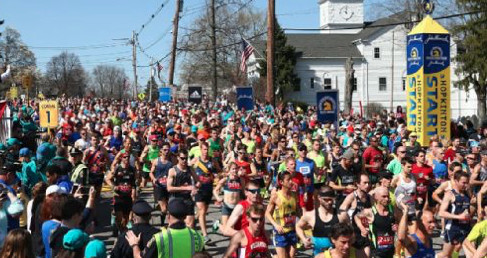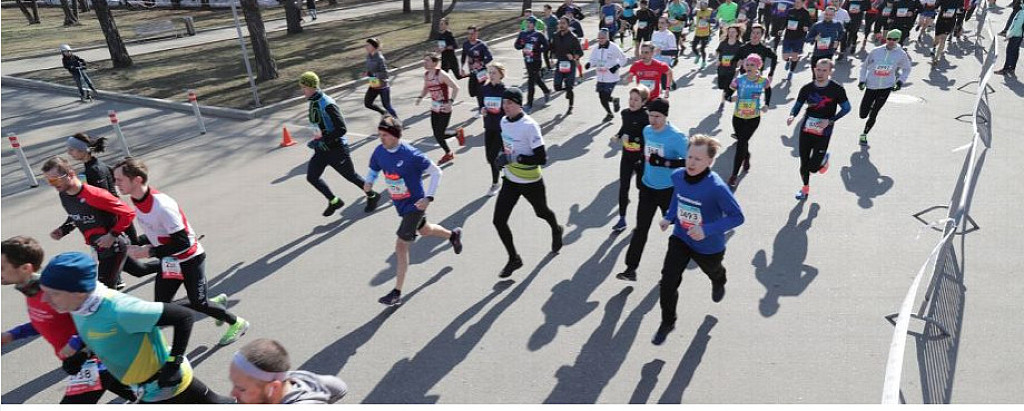Running News Daily
Running News Daily is edited by Bob Anderson. Send your news items to bob@mybestruns.com Advertising opportunities available. Train the Kenyan Way at KATA Kenya and Portugal owned and operated by Bob Anderson. Be sure to catch our movie A Long Run the movie KATA Running Camps and KATA Potato Farms - 31 now open in Kenya! https://kata.ke/
Index to Daily Posts · Sign Up For Updates · Run The World Feed
Running on empty: Coronavirus has changed the course for races big and small
The coronavirus pandemic has crippled the sports landscape. Leagues from the NBA all the way down to Little League Baseball have paused or canceled seasons.
In response to various stay-at-home orders that vary from state to state, people have been encouraged to exercise -- safely and while socially distancing. To run, walk and bike. Maybe, now with the idea, to one day compete in a 5K or a 10K race, maybe even a marathon.

When life resumes, whenever that is, those opportunities will be different and, in the case of some road races, not even there.
The racing organizations, big and small, that stage those events are having to grapple with postponements and cancellations to a point where they may not be able to ever come back at full strength.
Many of the world's largest marathons have already been impacted by the pandemic -- the Boston Marathon was postponed until September, the London Marathon until October and the Berlin Marathon, which had been scheduled for Oct. 24, has already been canceled.
Events that lead to mass gatherings, such as sports and concerts, are expected to be among the last to return even as the U.S. and the world look to reopen various businesses.
In the world of running, it is the smaller races -- from 5Ks and 10Ks to half marathons and marathons, many operated by local event organizers -- that are under financial stress.
In 2019, Running USA, an industry trade group, tracked more than 21,000 road races, which collected roughly $267 million in fees from more than 17.6 million registered runners.
Christine Bowen, vice president of programming partnerships and operations at Running USA, told ESPN.com that new estimates as of mid-March showed roughly 7,500 road races have been canceled so far into 2020, and thousands have been canceled since. That's more than 1.2 million participants who are left in limbo, she said -- and with more cancellations likely to come. In addition, race registrations nationwide are showing a 95 percent decline.
There's also the loss of raising money for charity, Bowen noted. Roughly 79 percent of road races are associated with at least one charity partner.
Fewer people signing up for races is one thing. The industry is also dealing with runners who are asking for their money back. While the average cost to enter a race is $70 to $79 per entry, many smaller events don't offer refunds, as those registration revenues are spent in advance for race security, staff, shirts, bibs, medals, water, snacks and other logistics -- sunk costs even if the races are not held.
"At the moment, I am not looking to register for any further road races as we have no idea what will happen," Samantha Music, a tax assistant who lives in Connecticut, said. "It is rather discouraging to continue to train even though the races are not happening."
Music had signed up to run seven races so far this year, with collective registration costs of more than $1,200. So far, six of the seven have been officially canceled, and a majority of the races, she said, are non-refundable.
However, two of the races did offer deferment for a non-complimentary guaranteed race entry for 2021 or a full refund and no-entry option for 2021. This means, if the race is lottery-based, she would need to reapply sometime next year.
"I am absolutely feeling stressed, as well as depressed about all the cancellations and losing money on the races that are being deferred to next year," Music said. "I understand that the race organizers have to pay for everything they ordered, but it doesn't suck any less to have to pay for a race again."
"I am absolutely feeling stressed, as well as depressed about all the cancelations and losing money on the races that are being deferred to next year."
Samanta Music, runner from Connecticut
The tune is a little different for Matt Becker, who is an applied mathematician at the Johns Hopkins University Applied Physics Laboratory in Maryland. Becker, who is new to the road race scene, and his wife had signed up for six races between the two of them so far in 2020. Five of them have been canceled or postponed, and of those five, four offered deferred payments for next year, or whenever the rescheduled race will take place.
"I think, on the whole, the race organizers are doing their best to accommodate difficult circumstances," Becker said. "Once it is safe to do so, I don't think I'll have any different approach to signing up for races in the future."
As part of its guidance to race directors, Running USA issued this statement:
"Negative comments about refunds, chargebacks and greed are swirling. The running industry especially is not a faceless group. ... it may be helpful to share with participants that many expenses are incurred months ahead of the event and the option of refunds really is not straightforward or always possible. Remind runners of your commitment to the community."
But will there be races for the community in the future?
Bowen said that though the average running organization employs eight full-time employees, there are contractors working with event management companies who also rely on the events as their main source of income.
According to the Endurance Sports Coalition, hundreds of thousands jobs are in jeopardy in that space. The coalition is made up of more than 475 endurance sports groups seeking relief from congress. The endurance sports industry -- which also includes events such as Tough Mudder and Ironman triathlons -- is a $3 billion industry that provides more than 500,000 jobs.
The coalition includes bigger races, like the Boston Marathon and Rock 'n' Roll marathon series, that will always have people clamoring to run them. It's the medium to smaller-sized races, and the companies that put them on, that are facing the direst of straits.
J.T. Service is the co-founder and CEO of Soul Focus Sports, an event management company in the San Francisco Bay Area that helps to put on a handful of road races.
Run Local Bay Area is a client of Soul Focus Sports, which puts on races including the San Jose Shamrock Run, the Silicon Valley Half Marathon and the Across the Bay 12K. The Silicon Valley Half Marathon -- which did not occur as planned on April 5 -- would have usually attracted between 3,000 and 5,000 runners.
"I almost want people to kind of think about us as local businesses," J.T. Service said. "There's this huge push of support your local business or support your corner pizza shop where you normally would get pizza. I think there needs to be this element of seeing the race, your local fundraising charity event, as that local business that needs just as much support now -- maybe more now than ever -- for the long term good of the community, so they can come back and open their doors and open their starting lines to runners when this thing is cleared up."
Through June, six races have been canceled under the Soul Focus Sports umbrella in the Bay Area. Service said they have lost "a few hundred thousand [dollars] in revenue" and that affects roughly a dozen event staffers.
To make up for lost races, runners have been encouraged to participate in virtual runs instead -- a way to both encourage running and return some value.
For many of these virtual events, runners can run the scheduled "race" distance when they want, where they want -- from a local trail to a treadmill -- and can then log their time results on the event's website to compare against others, and have their medals, race shirts and other "swag" shipped to them.
In addition to its Walt Disney World Marathon and other events, runDisney has been holding virtual races for five years. The Rock 'n' Roll marathon series and IRONMAN triathlon series -- both part of the Wanda Sports Group -- have begun offering competitive virtual events, and other race directors have taken creative approaches to keep runners active.
The Hartford Marathon Foundation, which organizes more than 30 annual races throughout New England, launched the "WeRunCT" virtual challenge to encourage people to collectively run the equivalent of every square mile of Connecticut (5,018 miles). Within three weeks, more than 1,250 participants ran the state of Connecticut 14 times over -- covering the square mileage of all of New England, approximately 71,500 miles.
"We understand how important it is for us to provide our running community with encouragement to keep active and maintain a healthy outlet to help manage stress during this unprecedented time," HMF CEO Beth Shluger said in a statement. "While we can't hold events and gather together, we're committed to providing ways for people to experience some of the enjoyment of racing through virtual events and challenges."
Bowen said there is a glass-half-full approach.
"I think that mental health area is really going to look more at [running]," she said. "I wouldn't be surprised if you start seeing companies sort of corporate wellness programs to say to their employees, 'Maybe sign up for a virtual race in the office because we're all working from home right now.' That's something to keep people engaged."
Virtual races can be positive, she said: "Right now, I will stay for sure, it's given companies an opportunity to be very creative in how they work with their runners and their sponsors."
Those virtual events could continue to be a source of revenue for race directors, and alternative social distancing options for runners. And Service, from Soul Focus Sports, sees another silver lining: Many people are taking up running while seeking exercise during the pandemic, and all those outside running every day could fall in love with the sport -- and could stick around for a while, too.
"So I see an opportunity for this industry, and that's from local specialty shoe shops to races -- but we have to be almost leaders, to the point of saying: Running is going to help bring this country back," Service said. "Why wouldn't be this our fuel or a thing that brings people back together?
"They're resilient people."
by ESPN
Login to leave a comment




